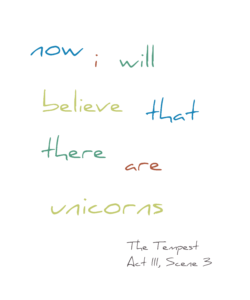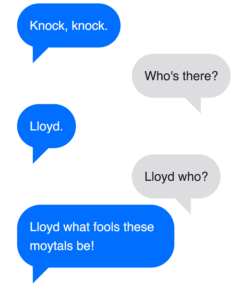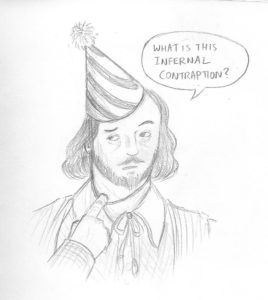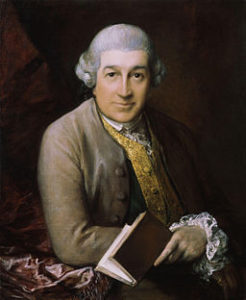Happy Shakespeare Day, everyone!
I hope everybody’s got plans to include Shakespeare in their day today, even if it’s just to wish people a Happy Shakespeare Day. Please get out of the habit of calling it Shakespeare’s Birthday, because then we inevitably get into that lengthy discussion about how he died on the same day, and then we end up counting anniversaries (it’s the 453rd anniversary of his birth and the 401st anniversary of his death). It’s Shakespeare Day. Celebrate Shakespeare.
Since we’re falling on a Sunday this year that can go two different ways. It’s the weekend, so maybe you’ve got time to get out and see a performance. But then again if you’re like me, most of your interaction with other people is during the work week, and on a Sunday you won’t do much more than chores around the house. Lucky for me this year there’s a volleyball tournament today, so by the time you read this I’m probably sitting on a folding chair in an auditorium somewhere waiting for my daughter’s team to come up in the rotation. So I can combine my two great loves – I can sit in front of the computer, and I can connect with Shakespeare, and people around the world who feel like I do.
I’m not one for celebration, outwardly. I’m a heck of an introvert. I watch game shows on tv and see people jumping up and down when they win a prize and my only thought is, “Oh, god, how do they generate that much energy?” If I went on a game show and won a new car my only reaction would be, “Awesome.”
But that doesn’t stop me from telling people that April 23 is a pretty huge holiday in my world. I’ll often use the word “religious” when trying to explain it, but I know that gets people uncomfortable. I spend lots of time thinking about things like belief, and how we ever really know what we believe, versus what we merely tell ourselves. I don’t necessarily believe that I’ll ever switch careers and become a full-time Shakespearean, or teach, or write a best seller. I’ve been entertaining those thoughts for twenty or more years but I know when it comes down to providing for my family my career lies in my computer skills, not Shakespeare.
So often the blog gets neglected as life gets busy and I focus on the more practical matters. On any given night you can find me juggling three choices for how to spend my evening, after the kids have gone to bed. I can go to bed too, and sometimes I do that. I can do stuff for my day job, telling myself that it’ll get me ahead, and more likely to be recognized when it comes time for salary bumps and promotions. Or, I can immerse myself in Shakespeare. Sometimes the posts just roll out of me and my best Shakespeare buddy Bardfilm will text me, “Where are all these posts coming from?!” But other times I’ll stare at the screen and think, “I haven’t posted in a week, I need to post something,” and it’ll feel more like I’m doing it because I have to, not because I want to.
But I’ll never give it up. Because when I really stop and think about it? When I really break it all the way down to what I know that I believe? It’s written up there at the top of the page. I believe that Shakespeare makes life better, and that by doing my part to spread Shakespeare in the world, I’m making other people’s lives better. Today is my day to remember that.
So it’s that time once again, my loyal readers. In the past I’ve had a great time doing a posting marathon, queuing up somewhere close to thirty posts on the day. When I first started it was some sort of personal challenge for just how much effort I could put into it. Who are we kidding, though – I can write these posts ahead of time now and just schedule them to come out throu ghout the day. True I still have to write them, but it’s not like I’m writing them in real time. The worst part, though, is that I would put out so many posts that most of them got buried and nobody would see them! That kind of kills the point.
ghout the day. True I still have to write them, but it’s not like I’m writing them in real time. The worst part, though, is that I would put out so many posts that most of them got buried and nobody would see them! That kind of kills the point.
I guess I’m saying that I’m ending that tradition. Don’t expect thirty or more posts from me today. I’d much rather have fewer posts and more conversation on them. If you want to share Shakespeare Day with me, then leave a comment on a post that you like. Not on the Facebook page or on Twitter, here on the blog. Those are what really feel permanent to me. I can still go back and look at conversations that we had in 2008 here. Try that on Twitter. Possible? Sure, technically. Does anybody do it? Nope.
There is one tradition I’m not ending, though, and it’s my own personal invocation of the Master to join us in spirit for today’s celebration. It makes me feel like a part of something hundreds of years in the making. Happy Shakespeare Day, everybody. And thank you, Shakespeare. I therefore will begin.
Soul of the age!
The applause, delight, the wonder of our stage!
My Shakespeare, rise!
Be sure to check out the new Shakespeare Geek Merchandise page, new for 2017 on Amazon! All new designs!


 the original material we’ve collected here over the years (hashtag games, knock knock jokes, etc…) All new designs. This is going to be stuff you can’t find anywhere else, and I’m hoping you like it!
the original material we’ve collected here over the years (hashtag games, knock knock jokes, etc…) All new designs. This is going to be stuff you can’t find anywhere else, and I’m hoping you like it! our account if they find you infringing on anybody. Plus, being Amazon, they work at a scale comparable to no one, so they can deliver a high-quality product and still keep it at a reasonable price. Right now I’ve got a $17.99 tag on the shirts (down from the standard $19.99) but for other services I’ve seen it go double that just to get a reasonable royalty back to the creator.
our account if they find you infringing on anybody. Plus, being Amazon, they work at a scale comparable to no one, so they can deliver a high-quality product and still keep it at a reasonable price. Right now I’ve got a $17.99 tag on the shirts (down from the standard $19.99) but for other services I’ve seen it go double that just to get a reasonable royalty back to the creator. at 99% of the product available is being cranked out by bots to flood the market. It’s all the exact same, no description, and no reviews. If we could get the brand to stand out it would help the products rise in the search ratings. This kicks me up a tier for Amazon, allowing me to churn out more product for you!
at 99% of the product available is being cranked out by bots to flood the market. It’s all the exact same, no description, and no reviews. If we could get the brand to stand out it would help the products rise in the search ratings. This kicks me up a tier for Amazon, allowing me to churn out more product for you! ghout the day. True I still have to write them, but it’s not like I’m writing them in real time. The worst part, though, is that I would put out so many posts that most of them got buried and nobody would see them! That kind of kills the point.
ghout the day. True I still have to write them, but it’s not like I’m writing them in real time. The worst part, though, is that I would put out so many posts that most of them got buried and nobody would see them! That kind of kills the point. responsibilities otherwise allow.
responsibilities otherwise allow.